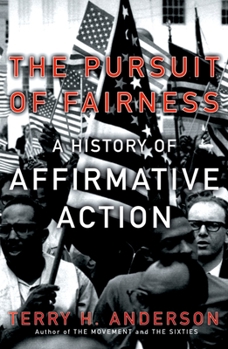The Pursuit of Fairness: A History of Affirmative Action
Select Format
Select Condition 
Book Overview
Affirmative action strikes at the heart of deeply held beliefs about employment and education, about fairness, and about the troubled history of race relations in America. Published on the 50th anniversary of Brown v. Board of Education, this is the only book available that gives readers a balanced, non-polemical, and lucid account of this highly contentious issue. Beginning with the roots of affirmative action, Anderson describes African-American demands for employment in the defense industry--spearheaded by A. Philip Randolph's threatened March on Washington in July 1941--and the desegregation of the armed forces after World War II. He investigates President Kennedy's historic 1961 executive order that introduced the term "affirmative action" during the early years of the civil rights movement and he examines President Johnson's attempts to gain equal opportunities for African Americans. He describes President Nixon's expansion of affirmative action with the Philadelphia Plan--which the Supreme Court upheld--along with President Carter's introduction of "set asides" for minority businesses and the Bakke ruling which allowed the use of race as one factor in college admissions. By the early 1980s many citizens were becoming alarmed by affirmative action, and that feeling was exemplified by the Reagan administration's backlash, which resulted in the demise and revision of affirmative action during the Clinton years. He concludes with a look at the University of Michigan cases of 2003, the current status of the policy, and its impact. Throughout, the author weighs each side of every issue--often finding merit in both arguments--resulting in an eminently fair account of one of America's most heated debates.
A colorful history that brings to life the politicians, legal minds, and ordinary people who have fought for or against affirmative action, The Pursuit of Fairness helps clear the air and calm the emotions, as it illuminates a difficult and critically important issue.
A colorful history that brings to life the politicians, legal minds, and ordinary people who have fought for or against affirmative action, The Pursuit of Fairness helps clear the air and calm the emotions, as it illuminates a difficult and critically important issue.
Format:Paperback
Language:English
ISBN:0195182456
ISBN13:9780195182453
Release Date:June 2005
Publisher:Oxford University Press
Length:344 Pages
Weight:1.10 lbs.
Dimensions:0.9" x 6.2" x 9.2"
Customer Reviews
2 ratings
Good introduction to affirmative action history
Published by Thriftbooks.com User , 19 years ago
Terry Anderson's book is the place to start for anyone who wishes to understand affirmative action's complex and perplexing story. Anderson's account is balanced and information packed and makes for good reading in addtion.
The origins of affirmative action
Published by Thriftbooks.com User , 19 years ago
This is an important history of the origins of affirmative action as a social policy for remedying racial inequality in the United States. In contrast to popular belief, affirmative action did not emerge full-blown in the late 1960s, as Anderson demonstrates we can trace its origins to the 1930s and President Franklin Delano Roosevelt's New Deal policy agenda. The book proceeds through the post World War II era to to show how thinking about such policy inititatives have shifted and changed up through the 1990s. Anderson concludes with the recent lawsuits filed against the University of Michigan and the Supreme Court's decisions on these two cases - Grutter and Gratz. The book tends to focus overly much on political history (as in politicians and the federal government) and less on grass roots social movements that forced such policy formations into the public domain. Nevertheless, it is an excellent resource for teaching undergraduates about the history of affirmative action in the U.S.






